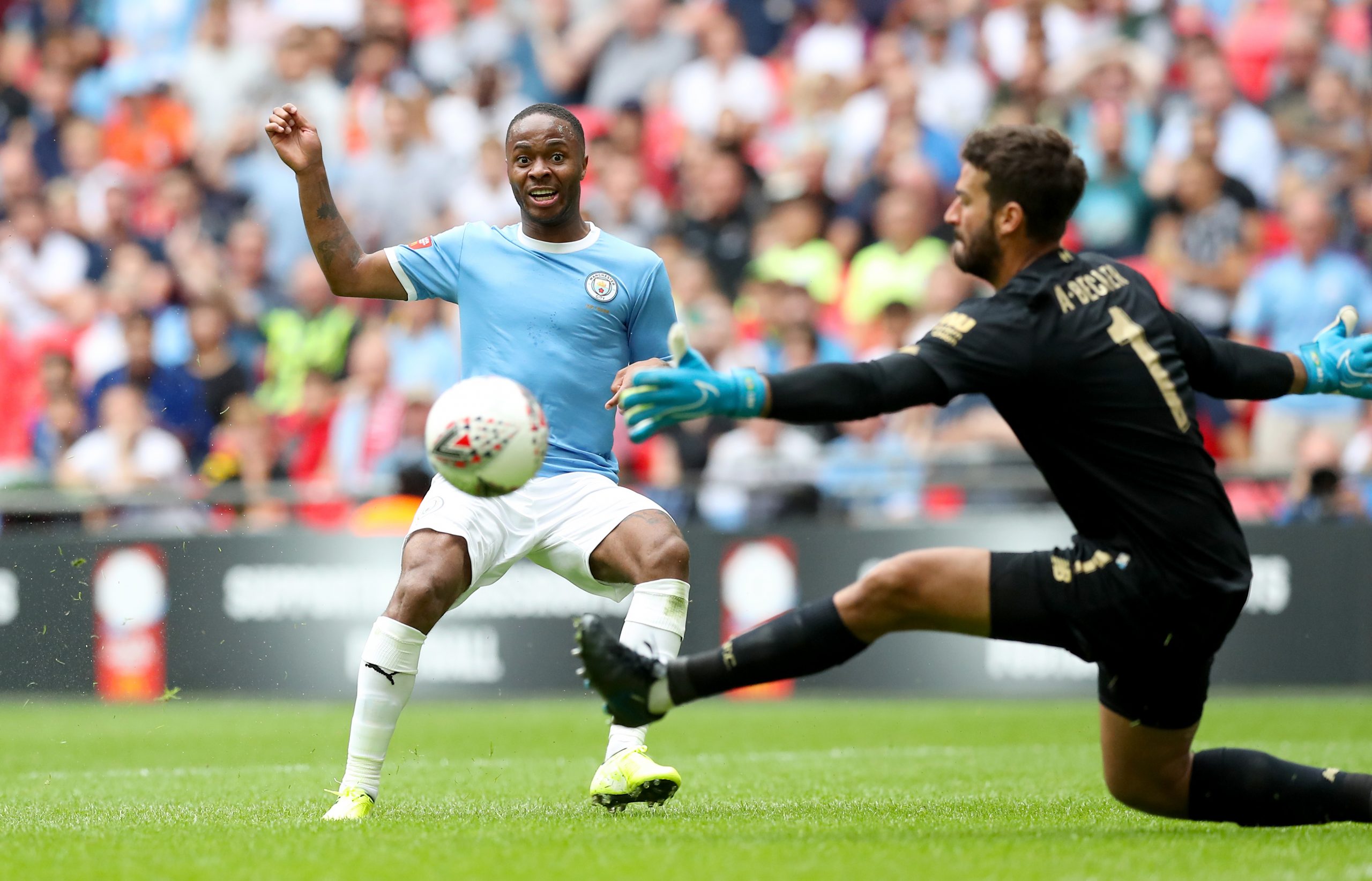It’s the first top of the table clash of the season and, to the surprise of many, the reigning champions are behind. The results shaking out the way they have mean that Jürgen Klopp’s Liverpool enter the fixture six points ahead of Pep Guardiola’s Manchester City. Such is the strength of City that the bookmakers generally give Liverpool an implied probability of only 54-58% to win the title, with City expected to at least close the gap over the rest of the season. This is what makes this Sunday such a knife edge: a nine point deficit could easily be too much to bridge. So how did we get here? Well, perhaps not as one might assume. In terms of expected goals, City are still crushing the league. On the attacking side, they’re generating 60% more expected goals than Liverpool while only looking slightly worse on the defensive end. In xG difference, it’s Guardiola’s Premier League and we’re just living in it. 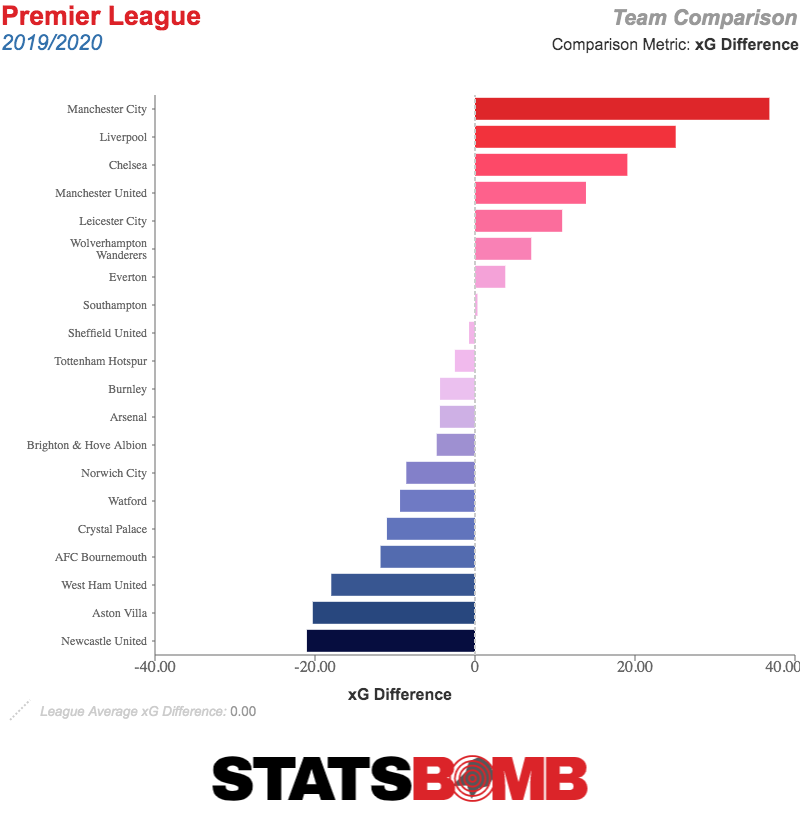 That shouldn’t imply that there are not real reasons why City have had a few wobbles, though. The defensive team radar comparing this season to last about sums up their struggles on that side of the ball: City are now a higher pressing side than ever, but at the same time are conceding chances of better quality than ever before, and have paid the price more than once.
That shouldn’t imply that there are not real reasons why City have had a few wobbles, though. The defensive team radar comparing this season to last about sums up their struggles on that side of the ball: City are now a higher pressing side than ever, but at the same time are conceding chances of better quality than ever before, and have paid the price more than once. 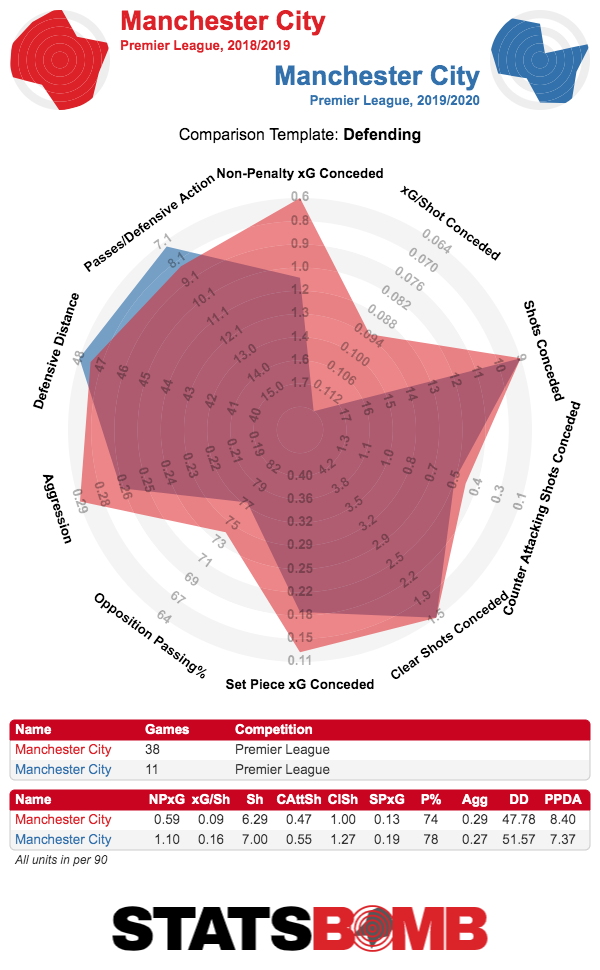 City’s central problem is that they’ve struggled to “cheat” the problems of a high press and prevent getting cut open in occasional moments when something goes wrong. I wrote about this in greater depth a month ago, but since then, Guardiola has tweaked things in hope of stopping the leak. The 4-4-2/4-2-3-1 shape he was experimenting with seems to have been shelved for now in favour of the tried and trusted 4-3-3, but this time with İlkay Gündoğan at the base of the midfield rather than Rodri (who now appears to be an option, at least in desperate times, at centre back). City have played three Premier League games since this switch, which is far too small a sample size to make huge conclusions, but the early evidence is good, even if they’re overperforming xG by quite a bit.
City’s central problem is that they’ve struggled to “cheat” the problems of a high press and prevent getting cut open in occasional moments when something goes wrong. I wrote about this in greater depth a month ago, but since then, Guardiola has tweaked things in hope of stopping the leak. The 4-4-2/4-2-3-1 shape he was experimenting with seems to have been shelved for now in favour of the tried and trusted 4-3-3, but this time with İlkay Gündoğan at the base of the midfield rather than Rodri (who now appears to be an option, at least in desperate times, at centre back). City have played three Premier League games since this switch, which is far too small a sample size to make huge conclusions, but the early evidence is good, even if they’re overperforming xG by quite a bit. 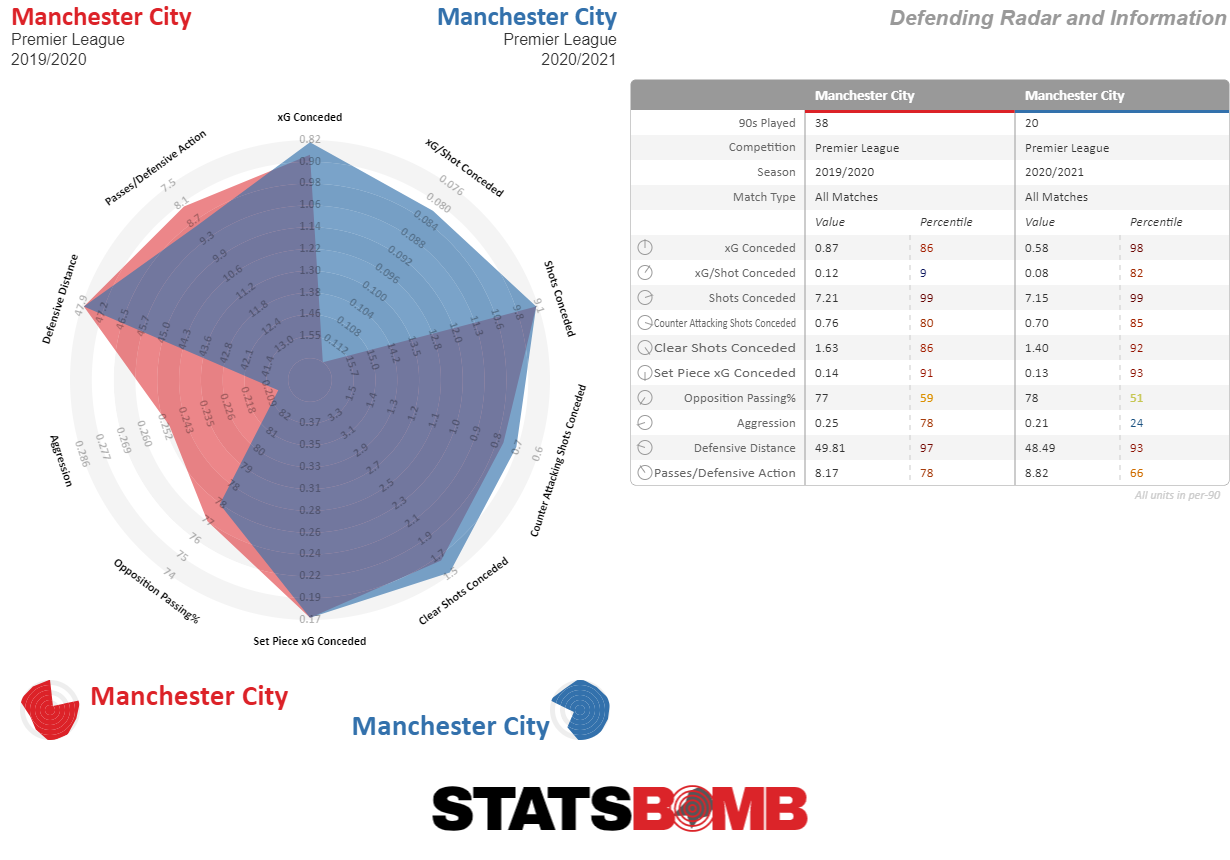 In this very small sample, the shots conceded per game has stayed consistent with what came before at seven, but the xG per shot conceded has fallen from 0.17 to a more manageable 0.13. To be very clear, we’re only talking a couple of shots being placed slightly differently here, so we shouldn't get ahead of ourselves, but it’s more the sort of stability that City had in the previous two seasons. If Gundogan is really to be the main defensive midfielder in this side rather than Rodri, then questions open up about his suitability in filling the role formerly held by Fernandinho. The Brazilian is often talked about for his genuine ability at tactical fouling, making around 1.6 fouls per 90 last season, but Gundogan has not generally managed anything like that rate in his career, failing to hit more than 1 per 90 in any of the seasons for which StatsBomb has collected data. He’s never been able to put in as many tackles and interceptions at the rate of Fernandinho. And for a role that in this particular system requires range and mobility, Gundogan’s injury record raises real concerns.
In this very small sample, the shots conceded per game has stayed consistent with what came before at seven, but the xG per shot conceded has fallen from 0.17 to a more manageable 0.13. To be very clear, we’re only talking a couple of shots being placed slightly differently here, so we shouldn't get ahead of ourselves, but it’s more the sort of stability that City had in the previous two seasons. If Gundogan is really to be the main defensive midfielder in this side rather than Rodri, then questions open up about his suitability in filling the role formerly held by Fernandinho. The Brazilian is often talked about for his genuine ability at tactical fouling, making around 1.6 fouls per 90 last season, but Gundogan has not generally managed anything like that rate in his career, failing to hit more than 1 per 90 in any of the seasons for which StatsBomb has collected data. He’s never been able to put in as many tackles and interceptions at the rate of Fernandinho. And for a role that in this particular system requires range and mobility, Gundogan’s injury record raises real concerns.  On the other side, the results just keep coming for Liverpool. An xG conceded per game of 0.96 is better than City’s, and only Leicester are outdoing it in the Premier League this season, but it’s still worse than last year’s 0.75. There’s better news beyond the xG. Liverpool are conceding fewer deep completions and fewer opposition passes inside the box than ever before. The passes inside the box tally is less than half the next best Premier League side or even the Liverpool of last season. It might just be that opposing attackers have been particularly adept at turning dangerous situations into shots. Liverpool might be as good as ever defensively, but it’s hard to say either way for sure.
On the other side, the results just keep coming for Liverpool. An xG conceded per game of 0.96 is better than City’s, and only Leicester are outdoing it in the Premier League this season, but it’s still worse than last year’s 0.75. There’s better news beyond the xG. Liverpool are conceding fewer deep completions and fewer opposition passes inside the box than ever before. The passes inside the box tally is less than half the next best Premier League side or even the Liverpool of last season. It might just be that opposing attackers have been particularly adept at turning dangerous situations into shots. Liverpool might be as good as ever defensively, but it’s hard to say either way for sure. 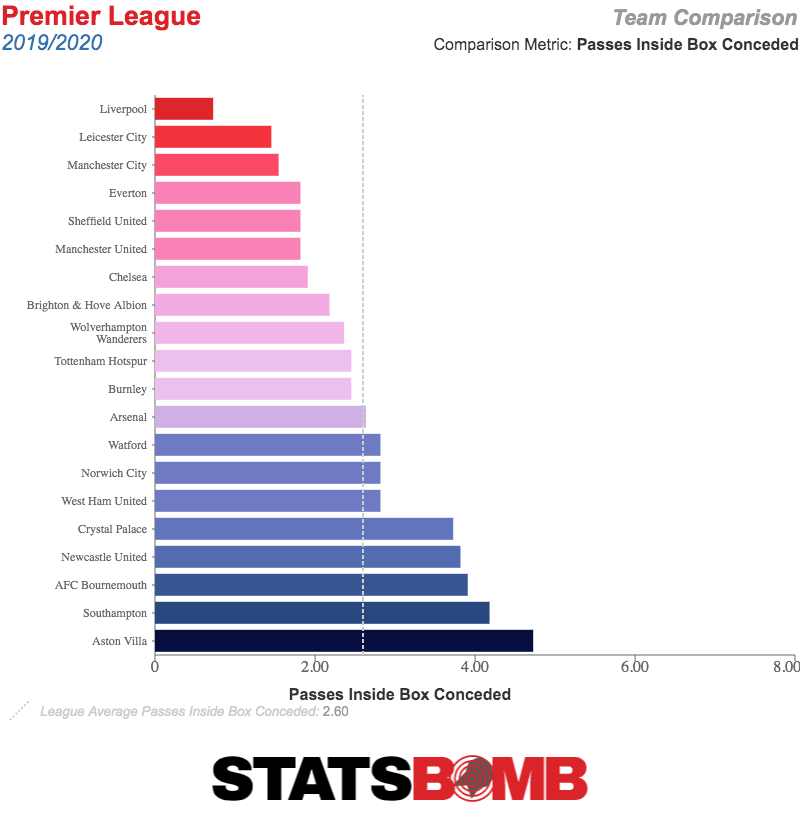 On the attacking side, Liverpool’s output looks largely consistent with last year, and it’s the way they do it that has drawn the most attention. The way Klopp instructs his side to attack is to move the ball from the fullbacks into the front three, ignoring almost any notion of creative passing through midfield. In terms of progressing the ball into the final third, the two fullbacks, Trent Alexander-Arnold and Andrew Robertson, lead the way along with Fabinho. When it comes to open passes into the box, it’s the fullbacks again with Sadio Mane. The two number eights, Gini Wijnaldum and Jordan Henderson, just don’t play important parts in moving the ball forward for Liverpool. Alexander-Arnold in particular is really becoming the side’s most important playmaker, putting up a monster 0.36 xG assisted per 90 (albeit including set pieces). Liverpool are able to play this way because their fullbacks are so useful in possession, and the defensive end stays solid because the midfielders are given so little freedom. The template for Liverpool vs Manchester City games has been well established at this point. City play their usual intricate football of working the ball through the midfield, into the “free eights” and to the wide players to attempt create their exquisite chances, while Liverpool engage in a counter-press, attempt to win the ball and attack when City are in a poor shape counterattack down the half spaces. It’s a tactical rhythm that feels predictable now, and if the game pans out this way, both sides should have a fair few chances with the magic of finishing to perhaps be the deciding factor. There are two games between the sides in recent seasons that didn’t fall into that pattern, however. The first was City’s 5-0 drubbing of Liverpool at the Etihad in September 2017. The most important moment of that match was Mane’s first half sending off, which forced Liverpool to retreat and largely just defend their own goal, which they did poorly. Barring any unexpected reckless challenges, it doesn’t seem like that game is hugely relevant to this one. The other fixture, though, was last season’s October 0-0 draw at Anfield. This one was very unusual in that Guardiola seemed content with taking a point. The two sides combined for all of 12 non-penalty shots, none of them particularly good chances, and every neutral went home disappointed. It might be that the Catalan feels six points is too big a gap to take a draw, but this scenario is entirely on the table and could lead to another underwhelming encounter. The case for City settling for the point, for trusting that they can bridge the six point gap over the season, is in the numbers. City have been playing better football than Liverpool first and foremost, yes, but they’ve also been playing more attacking football. A more expansive game should, in theory, be the more effective way of picking up a huge points total when facing teams of lower ability than themselves. Liverpool’s much less expansive approach relies on keeping it tighter and wearing down the opposition as things go on, with lower scoring fixtures. City’s approach should be capable of overpowering just about everyone. Even in situations where they concede, it’s a question of how many goals you need to score to get a point against City. The case that they need the win here is in the fixture list. Liverpool have already faced Chelsea, Tottenham, Manchester United and, if we’re expanding the scope of the elite club to seven, Leicester. This game will complete the set of fixtures against the “big teams” for Klopp’s side in the first half of the season. City, by comparison, have only faced Tottenham of this group so far. The fixture list gets real across November and December, and City will need to be near perfect in these games if Liverpool do not provide serious slip ups. It’s well within their capability to do so (especially taking into account that performances so far this season raise serious questions about just how elite various members of the elite group of seven are), but Guardiola wouldn’t be making life easy for himself if he didn’t close the gap to three points on Sunday. If Liverpool were to win, a gap of nine points would certainly create a different dynamic. Klopp’s team could conceivably ease off a touch and still have a very good chance of winning the title. City could play their best football and still fail to lift the trophy in May. It is for that reason that playing it safe is on the cards for Guardiola. Header image courtesy of the Press Association
On the attacking side, Liverpool’s output looks largely consistent with last year, and it’s the way they do it that has drawn the most attention. The way Klopp instructs his side to attack is to move the ball from the fullbacks into the front three, ignoring almost any notion of creative passing through midfield. In terms of progressing the ball into the final third, the two fullbacks, Trent Alexander-Arnold and Andrew Robertson, lead the way along with Fabinho. When it comes to open passes into the box, it’s the fullbacks again with Sadio Mane. The two number eights, Gini Wijnaldum and Jordan Henderson, just don’t play important parts in moving the ball forward for Liverpool. Alexander-Arnold in particular is really becoming the side’s most important playmaker, putting up a monster 0.36 xG assisted per 90 (albeit including set pieces). Liverpool are able to play this way because their fullbacks are so useful in possession, and the defensive end stays solid because the midfielders are given so little freedom. The template for Liverpool vs Manchester City games has been well established at this point. City play their usual intricate football of working the ball through the midfield, into the “free eights” and to the wide players to attempt create their exquisite chances, while Liverpool engage in a counter-press, attempt to win the ball and attack when City are in a poor shape counterattack down the half spaces. It’s a tactical rhythm that feels predictable now, and if the game pans out this way, both sides should have a fair few chances with the magic of finishing to perhaps be the deciding factor. There are two games between the sides in recent seasons that didn’t fall into that pattern, however. The first was City’s 5-0 drubbing of Liverpool at the Etihad in September 2017. The most important moment of that match was Mane’s first half sending off, which forced Liverpool to retreat and largely just defend their own goal, which they did poorly. Barring any unexpected reckless challenges, it doesn’t seem like that game is hugely relevant to this one. The other fixture, though, was last season’s October 0-0 draw at Anfield. This one was very unusual in that Guardiola seemed content with taking a point. The two sides combined for all of 12 non-penalty shots, none of them particularly good chances, and every neutral went home disappointed. It might be that the Catalan feels six points is too big a gap to take a draw, but this scenario is entirely on the table and could lead to another underwhelming encounter. The case for City settling for the point, for trusting that they can bridge the six point gap over the season, is in the numbers. City have been playing better football than Liverpool first and foremost, yes, but they’ve also been playing more attacking football. A more expansive game should, in theory, be the more effective way of picking up a huge points total when facing teams of lower ability than themselves. Liverpool’s much less expansive approach relies on keeping it tighter and wearing down the opposition as things go on, with lower scoring fixtures. City’s approach should be capable of overpowering just about everyone. Even in situations where they concede, it’s a question of how many goals you need to score to get a point against City. The case that they need the win here is in the fixture list. Liverpool have already faced Chelsea, Tottenham, Manchester United and, if we’re expanding the scope of the elite club to seven, Leicester. This game will complete the set of fixtures against the “big teams” for Klopp’s side in the first half of the season. City, by comparison, have only faced Tottenham of this group so far. The fixture list gets real across November and December, and City will need to be near perfect in these games if Liverpool do not provide serious slip ups. It’s well within their capability to do so (especially taking into account that performances so far this season raise serious questions about just how elite various members of the elite group of seven are), but Guardiola wouldn’t be making life easy for himself if he didn’t close the gap to three points on Sunday. If Liverpool were to win, a gap of nine points would certainly create a different dynamic. Klopp’s team could conceivably ease off a touch and still have a very good chance of winning the title. City could play their best football and still fail to lift the trophy in May. It is for that reason that playing it safe is on the cards for Guardiola. Header image courtesy of the Press Association
2019
Is this the most decisive week in the Premier League title race?
By admin
|
November 6, 2019
